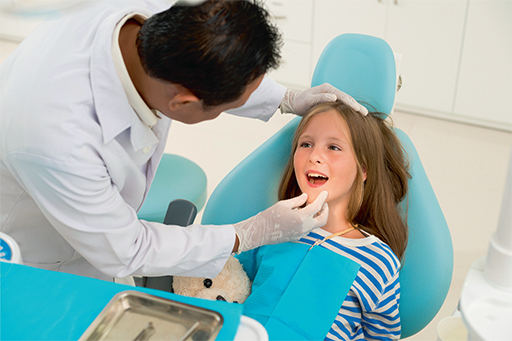In Healthy living
Follow this topic
Bookmark
Record learning outcomes
A high number of children in England don't visit a dentist each year, and the rate of dental decay in young children remains high due to lack of education and poor diet. We look at how community pharmacies can play a proactive role in improving the nation's dental health
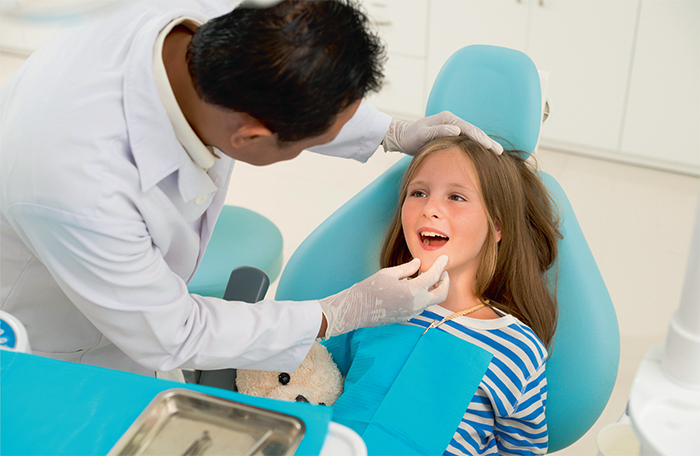
In Britain, almost one in three five-year-olds suffers from tooth decay and it's the most common reason why five-to nine-year-olds are admitted to hospital, according to a report by the Royal College of Surgeons (RCS), The State Of Children's Oral Health In England. The Faculty of Dental Surgeons at the RCS is seriously concerned about the state of children's teeth and recommends that access to NHS dental services be improved so children can visit a dentist regularly for preventive advice and get any problems treated early. More than 30 percent of children didn't see a dentist between 2012 and 2014, data show.
The report highlights the need for parents and children to be educated about the risks of tooth decay and the importance of good oral hygiene in order to prevent decay. This is an area where pharmacy staff could play an important role.
"Community pharmacies are easily accessible," says Dr. Phil Stemmer, dentist and founder of the Fresh Breath Centre. "They have specific knowledge on dental care and good relations with their customers. They are seen as non-threatening, so customers may be more comfortable discussing oral care with them than with a dentist."
"You need to catch parents early, ideally during pregnancy, and speak to them about how it's essential to begin looking after a baby's teeth as soon as they appear. You can advise them on using age-appropriate paste and brushes, too."
Mhari Coxon, a trustee and dental hygienist at the British Dental Health Foundation, agrees. "Often the pharmacy will be the first port of call: for tooth pain, broken fillings, bleeding gums," she says. "It's essential that staff are well educated about oral care so they can confidently offer good advice."
"We know there are barriers to visiting the dentist and this is something pharmacists could help with. Local pharmacies have good relations with their customers and with local dentists. They can encourage parents to visit their dentist and remind them that the service is free for all children as well as during pregnancy."
Children's primary teeth are more susceptible to decay than permanent teeth, they have thinner enamel, which offers less protection from bacteria. When tooth decay isn't diagnosed and treated early, children may need hospital treatment. This can be distressing and costly, with £30 million a year spent on hospital-based extractions for under-18s.
It's estimated that 90 percent of decay is preventable with good oral care. The main preventive advice to give parents is:
- Register your child with a dentist as soon as their first teeth appear and visit regularly
- Brush with fluoride paste for two minutes twice daily and supervise brushing until age eight
- Limit sugary food and drinks to meal times. Give only milk or water to young children
- Give drinks from free-flow cups from age six months and stop bottle feeding from 12 months
- Give only sugar-free medicines where possible.
Education is key
"Hidden sugars are the main area where pharmacy staff could help give more education to parents," says Ms. Coxon. "Advise sugar-free medicines where possible. If it's not, suggest using a fluoride mouthwash. This is also good for children who've had decay.
"If a child has to use a sugar-containing medicine, advise parents to brush their child's teeth first to remove bacteria that react with the sugar to cause decay. A syringe applicator is a good idea as it keeps the medicine away from teeth."
Tepe brand manager Nicky Godfrey says: "Pharmacists can play an important role in supporting the use of fluoride toothpaste to help protect the enamel and the use of plaque disclosing tablets that make identifying plaque simple and fun for children."
Build a successful oral care category
Well, Pharmacy commercial manager Jennifer Rann says customers in its stores are trading up to premium oral care products. "Whitening and cavity protection pastes are popular, while power brushes continue to grow sales, as well as premium fresh breath mouthwashes," she says. But even with premium products, she stresses that promotions are still key. "This gives customers the confidence to try these products at a lower price," she says. Increase stocks of promotional
Stock specialist oral care products
It makes sense to offer your customers service and products they can't get through grocery outlets. Specialist oral care products are a good way of competing in the oral care market and offering your customers a unique service.
"Specialist products that local pharmacies should consider stocking include high-fluoride toothpaste, interdental brushes, specialist mouthwashes, flosses, and dental tapes say, Dr. Stemmer. “You need to know about and understand all these products so you can advise patients on the best choice and how to use them effectively."
Ms. Coxon has this advice: "Daktarin oral gel is an excellent product to stock because it's good for thrush caused by dentures or dry mouth. Chlorhexidine mouthwash is important for gum disease. Ulcer products are important, too. Stock a good range of products for dry mouth as more than 400 types of daily medication can cause this. Sugar-free gum is useful for dry mouth."
Ms. Godfrey stresses the importance of stocking floss and inter-dental brushes. "It's important to get the message across that tooth brushing alone is not enough as the brush will only reach 60 percent of the surfaces of the teeth, the remaining 40 percent can only be accessed by floss and inter-dental brushes," she says.
Tepe notes a trend of increased sales of specialist products for cleaning around dental implants and bridges. "The rapid growth in the dental implant market has given rise to a small range of specialist cleaning tools that are not readily available in retail, so the Tepe Implant Care, our Super Soft Special Care brushes, and a new bridge and implant floss will become key products in pharmacy."
NICE advises dentists on oral care promotion
NICE has published new guidance for dentists on how they can improve the public's experience of visiting the dental surgery in a bid to encourage more people to go regularly.
Some 31 percent of adults and 28 percent of children have decay. More than one in four adults report dental pain. Even though routine dental check-ups contribute to oral health, many people still only go to a dentist in a dental emergency (22 percent of high and 34 percent of low socio-economic groups).
Messages given to the public should include:
- Advice on oral hygiene practices and the use of fluoride
- Advice about diet, smoking, smokeless tobacco, and alcohol intake.
Dental teams are advised to be aware of the personal, cultural, social, environmental, and economic barriers to good oral health. This includes:
- The links between poor oral health and socioeconomic deprivation
- Recognising that some people may not think it is important to go to the dentist regularly
- Understanding that some parents or carers may not realize that it is important to keep children's primary teeth healthy
- Being aware that some people may need help to use dental services.
NICE guidance on oral care for residents in care homes was also issued in December.
Build a successful oral care category
Well, Pharmacy commercial manager Jennifer Rann says customers in its stores are trading up to premium oral care products. "Whitening and cavity protection pastes are popular, while power brushes continue to grow in sales, as well as premium fresh breath mouthwashes," she says.
But even with premium products, she stresses that promotions are still key. "This gives customers the confidence to try these products at a lower price," she says. "Increase stocks of promotional lines to ensure maximum sales and give customers the offers they are looking to buy into."
She stresses the importance of good product knowledge as well as good oral care understanding. "It is a confusing category to shop and it can be confusing for customers to understand the benefits and the one that suits their needs," says Ms. Rann. "Merchandising oral products together will help, as will informing customers how important it is to rinse and floss as well as brush teeth."
At Day-Lewis pharmacy group, professional services pharmacist Rebecca Myers says: "We've certainly seen a change in what sells well in recent years. Areas of growth are in higher-end lines such as specialist mouthwashes, pastes for sensitive teeth, whitening products, flosses, tapes, and electric brushes. Areas that have shown no growth or decline are traditional brushes and pastes."
"Medicinal products remain fairly constant. Customers still typically require advice regarding medicinal dental products and growth in the mouthwashes range has led to increased training in this area with respect to advice on fluoride content and treatment of gingivitis."
"With parents make every contact count. When answering queries about teething, get in early and talk about cleaning babies' teeth. When recommending oral cough/cold medicines or pain relief, use the opportunity to discuss the sugar content of the medicine and good dental hygiene."
She would advise pharmacists to keep only a small selection of traditional brushes and pastes. A dental planogram she recommends includes:
- Small selection of high-end toothbrushes,
- Electric brushes and heads,
- Larger selection of tapes, flosses, and picks,
- Reduced selection of denture products,
- Increased selection of the more medicinal pastes and mouthwashes.
Numark communications manager Emma Charlesworth says some of its members are working collaboratively with dentists through LPC/LDC. "They signpost each other's services and run joint health promotions," she says. "With future plans for the NHS, this makes sense and should result in a more coordinated service."
For a more successful category, she says: "It is important that your oral care fixture has appropriate space allocation in line with subcategory share. Consider the breakdown of the different sub-categories such as denture products or pastes. Allocate sufficient space to categories that customers are most likely to buy from."
"Use brands synonymous with oral care to help signpost the category. Use Colgate as a beacon brand for the category. Your section should reflect products that not only sell well but deliver good profit and value to your pharmacy. Our recommendation is to stock a brand leader and an own brand for each."
"Toothbrushes and pastes should sit together on shelves. We recommend denture care is positioned in an accessible place due to its target market. A denture is a 'destination' category for pharmacy, so should be displayed prominently. Merchandising children's oral care items together and at their eye level can help drive sales and it also gives you the perfect opportunity to offer advice and support on children's oral health.
Other ways to improve sales include offering advice on how often customers should change their toothbrushes, the benefits of different types of brushes, and the various types of paste, says Ms. Charlesworth.
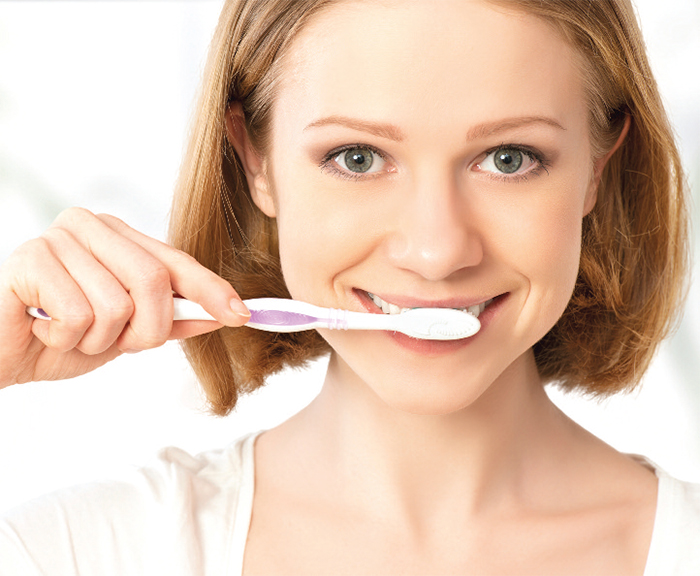 Oral care category trends
Oral care category trends
Dental floss sales are an area ripe for growth, with only 43 percent of adults have used it in the past three months, says market research company Mintel (Oral Care report, June 2015). Alcohol-free mouthwash is also a growth sector, with 17 percent of adults using it.
The oral care market is predicted to grow by 8 percent by 2020 to an estimated £1.25 billion. An important trend to watch in the category, says Mintel, is the use of natural ingredients where possible.
Would a sugar tax help to improve dental health?
The Scientific Advisory Committee on Nutrition has recommended our maximum sugar intake should be halved and not exceed 5 percent of total dietary energy. It also recommends consumption of sugary drinks be minimized by adults and children.
A tax of 10 to 20 percent on high-sugar products such as soft drinks is being recommended. "A sugar tax is essential. If we don't have it we'll continue to pay out huge sums to repair decay in the population," says dentist Dr. Phil Stemmer.
"In Mexico, where a tax was imposed to reduce the high incidence of diabetes, it's worked well," says BDA dental hygienist Mhari Coxon. "There are a lot of general anesthetics used to treat decay in children, which is costly and traumatic. A tax could reduce this. The tax money collected will go towards educating the public about sugar and diet. It's not about policing what people eat or drink, it's about educating them so they know the facts. Currently, we are only treating the symptoms of excess sugar consumption, not the causes. This needs to change."
Data show that more than 30 per cent of children didn't see a dentist between 2012 and 2014
Comment
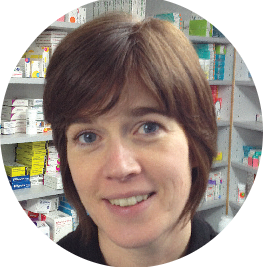 Fiona McElrea, Whithorn Pharmacy, Whithorn "This is a big category for us, and we deal with a lot of OTC requests for problems such as toothache, ulcers, and oral thrush. With dental pain, we'll check to see if they've seen a dentist, then if appropriate, will give advice for pain, as well as offer certain mouthwashes. Corsodyl is useful to try and stop infection. Some patients aren't registered with a dentist, so we have local information from the health board to give to patients to register and be seen by a dentist. We have a specified dental section and we keep our staff well trained on these issues. Our best-selling products tend to be Corsodyl, Bonjela, Ambesol liquid, and Orajel. We can prescribe certain products as part of the minor ailments scheme."
Fiona McElrea, Whithorn Pharmacy, Whithorn "This is a big category for us, and we deal with a lot of OTC requests for problems such as toothache, ulcers, and oral thrush. With dental pain, we'll check to see if they've seen a dentist, then if appropriate, will give advice for pain, as well as offer certain mouthwashes. Corsodyl is useful to try and stop infection. Some patients aren't registered with a dentist, so we have local information from the health board to give to patients to register and be seen by a dentist. We have a specified dental section and we keep our staff well trained on these issues. Our best-selling products tend to be Corsodyl, Bonjela, Ambesol liquid, and Orajel. We can prescribe certain products as part of the minor ailments scheme."
 Nemesh Patel, Day-Lewis Pharmacy, Chelmsford "We find a simplified core product range containing products, such as Corsodyl and Sensodyne, merchandising and promotions help drive sales growth. I would recommend subcategory segments merchandised together, to help customers identify the product(s) they require, eg toothbrushes and mouthwashes together. Everyone on our team has an excellent relationship with our local dental surgery and is skilled at offering advice promoting good oral hygiene and combating ailments, such as halitosis and oral thrush. Paramol is our best-selling dental pain product, although we do find that traditional remedies, such as clove oil, are still popular. with some of our customers."
Nemesh Patel, Day-Lewis Pharmacy, Chelmsford "We find a simplified core product range containing products, such as Corsodyl and Sensodyne, merchandising and promotions help drive sales growth. I would recommend subcategory segments merchandised together, to help customers identify the product(s) they require, eg toothbrushes and mouthwashes together. Everyone on our team has an excellent relationship with our local dental surgery and is skilled at offering advice promoting good oral hygiene and combating ailments, such as halitosis and oral thrush. Paramol is our best-selling dental pain product, although we do find that traditional remedies, such as clove oil, are still popular. with some of our customers."
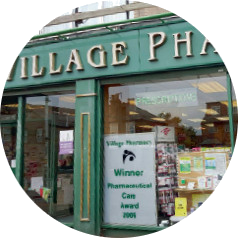 Rena Dadra, Village Pharmacy, Harlington "The main oral care brands we sell really depends on what's being promoted advertising-wise. For example, Oral B Whitening has been on TV quite a lot recently. But many customers already know what they want when they come in. Generally, it is the Oral B range we sell the most of, as well as Corsodyl, which I usually recommend if someone speaks to me about gum issues. We've increased our dental area in the pharmacy recently and now we've got a whole section devoted to toothbrushes, toothpastes and the TePe cleaning brushes. We also have a new area focusing on the dry mouth range. At the moment this is not a massive seller, but I think if it had an advertising push we'd see demand rise massively."
Rena Dadra, Village Pharmacy, Harlington "The main oral care brands we sell really depends on what's being promoted advertising-wise. For example, Oral B Whitening has been on TV quite a lot recently. But many customers already know what they want when they come in. Generally, it is the Oral B range we sell the most of, as well as Corsodyl, which I usually recommend if someone speaks to me about gum issues. We've increased our dental area in the pharmacy recently and now we've got a whole section devoted to toothbrushes, toothpastes and the TePe cleaning brushes. We also have a new area focusing on the dry mouth range. At the moment this is not a massive seller, but I think if it had an advertising push we'd see demand rise massively."

